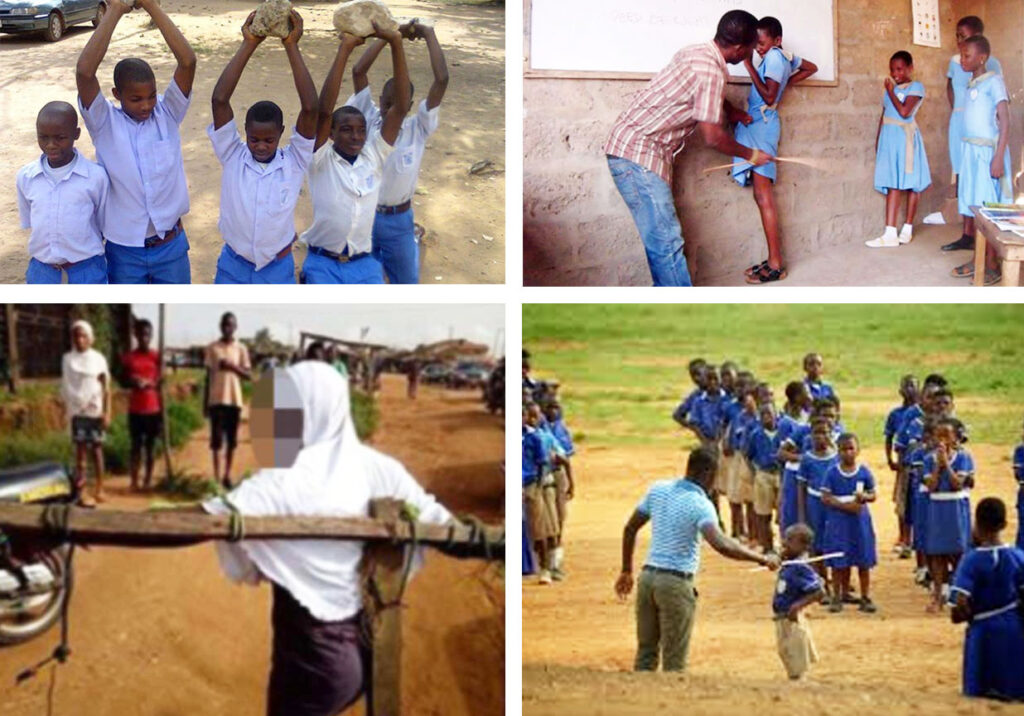It started with a Facebook discussion forum and metamorphosed into a much more serious issue – the dire effects of bodily punishment in the Nigeria’s education sector.

By Anthony Obi Ogbo
After watching a video of how the Russian President Vladimir Putin veered from a Victory Day Parade protocol in Moscow to embrace his former schoolteacher Vera Gurevich, a Nigerian social media commentator, Doris Chii Nwike, recanted her own school experience with teachers. This was not a joke.
“I don’t think I’ll ever stop to hug my maths teacher, Mrs. Okigbo and my Religious knowledge teacher Sister Rose – a Catholic Nun,” Doris wrote. She continued. “Mrs. Okigbo flogged me mercilessly because I couldn’t make head or tail of what she teaches in mathematics, not only me but almost everyone. We take math lessons in fear! Sister Rose wields her cane with relish all the time; she relished pleasure in the canes and flogging. There is no pity in her dictionary, that is why till today, I find it hard putting any of my kids in a school being run by reverend sisters.”
But Doris was not done. In her narrative, not all her teachers were brutal. There was one teacher that she would hug any day. According to Doris, “When we would be assembling in the staff room to be punished, it is only Mrs. Florence Onyema Obiechina that would look at this lanky fair-skinned girl with a red birthmark on her left arm, and would motion me to kneel by her side to prevent Sister Rose from flogging me and my skin turning red. She will be the one I’ll give my hug and some of my other kind-hearted teachers.”

Doris’s account thus generated a long discussion thread of forum participants, mainly from Nigeria, narrating their own experience. Interestingly, Mrs. Obiechina joined the discussion thread to explain the secrets behind her successful classroom instructional strategies. According to Mrs. Obiechina, “I strongly believe that students can perform excellently well without being flogged. Flogging scares students and makes them hate the subject. A teacher who wants her students to perform well must have a good knowledge of the subject, lay a good foundation for the students and make serious efforts to instill knowledge into the students using instructional materials while ensuring active participation of the students in the class.”
In further explanation of what might contradict the traditional corporal punishment approach, Mrs. Obiechina, an alumni of the University of Winnipeg in Manitoba, Canada stated, “I taught with no cane and it worked perfectly for me since my students perform excellently well in all schools I was opportune to serve. Whenever I meet my students, they always show great appreciation.”

In Nigeria’s school system, corporal punishment remains a disturbing classroom supervision tool. Children are beaten, flogged, slapped, spanked, punched, or even kicked for violating common rules. They are hit with objects, ordered to kneel down under severe weather for extended time periods, and in the other circumstances, restrained not only by teachers but also by older pupils authorized to supervise newer ones.
“I strongly believe that students can perform excellently well without being flogged. Flogging scares students and makes them hate the subject. A teacher who wants her students to perform well must have a good knowledge of the subject, lay a good foundation for the students and make serious efforts to instill knowledge into the students using instructional materials while ensuring active participation of the students in the class.”
Florence Onyema Obiechina
Last year, for instance, students were being tied to makeshift crucifixes and flogged with horsewhips for coming late to school. This happened in a private school in Abeokuta, Ogun State south-west Nigeria. After a public uproar, the police arrested three people, including a school principal suspected to be involved in the incident for questioning.
In Nasarawa State, a video of ruthless beating of some students of Government Science Secondary School Nasarawa-Eggon went viral on the social media, prompting the Commissioner for Education, Ahmed Tijani to ban corporal punishment in public schools in the state. He went further to announce that the State had established a committee to investigate this incident. His Ministry also issued a memo to all public schools informing the management of the various schools on the ban on corporal punishment.
Without the doubt, managing school children is not an easy task. The challenge entails supervising a set of different individuals from different social and economic backgrounds; managing their conduct and conception levels; Creating a conducive learning environment to inspire their hope, improve learning, and reinforce their academic guidelines and required standards. Corporal punishment does not fit the aforementioned values.
If nothing else, Doris’s account highlights one of the devastating effects of corporal punishment – a gap in the relationship between the teacher and student. Her closeness with her favorite teacher, Mrs. Obiechina was based on her transformational teaching strategies – a teacher-student approach that prioritizes cultivation of knowledge as a foundation for success. This approach replicates a study by Clayton et al., which underscores how the foundational aspect of a positive school experience is reliant on positive impact of a strong teacher–student relationship.
Students cannot learn under excruciating circumstances of fear and tyranny perpetrated by instructors who they see as Killer-Dinosaurs. Thus, building relationships remain the most effective classroom management technique. This approach instills confidence, love, and knowledge in the learning system. It creates an encouraging environment where rules are hardly broken because students are more focused on academic accomplishments.
This article does not advocate a disregard of lawlessness in the classrooms. Rather, it emphasizes a learning environment immune from torture and bullying. The setting must instill love, trust, hope, and aspiration. Good teachers are explicit about their expectations regarding classroom behavior. They often explain the rules and applied them in a non-brutal, fair-minded, and consistent manner. The classroom should be a family not a torturing camp.
♦ Anthony Ogbo, PhD, Adjunct Professor at the Texas Southern University is the author of the Influence of Leadership (2015) and the Maxims of Political Leadership (2019). Contact: anthony@guardiannews.us

Leave a Reply